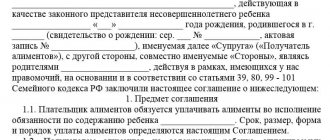Does the husband pay for disability groups 1, 2, 3?
Disabled people of groups 1, 2, 3 are required to pay alimony for the maintenance of their minor children, regardless of their official employment. The disability pension is a source of income, and accordingly it can be levied.
Disabled people of all groups are burdened with alimony in the following cases:
- they have a minor child;
- at the time of the divorce, the wife was pregnant (or paternity was duly established);
- for an ex-wife (even a common-law spouse), if she is on leave to care for a child under three years of age (we talked more about the grounds for paying alimony for a wife on maternity leave here);
- the spouse is caring for a child with a disability (more information about child support for a disabled child and the spouse caring for him can be found here).
Reference! Payment of alimony to a woman on maternity leave does not exempt the disabled person from paying alimony for a minor child.
Summary
To the question: “Do disabled people pay alimony to their children?”, we answer: “Yes!” As it turned out, all adults are obliged to bear material obligations to their children. Thus, alimony from a pension upon the onset of disability of group 3, as well as the first and second groups, is collected in full accordance with current legislation.
The disability pension received by the parents, which is paid by the state, is the very source of income from which the law requires the withdrawal of alimony money. At the same time, not only relatives, but also adopted children have the right to receive money from a disability pension.
These legal norms are clearly defined and must be strictly implemented so that every child has a decent and prosperous childhood.
Are payments collected from the disability pension?
Taking into account the provisions of subparagraph “a” of paragraph 2 of the Appendix to Government Decree No. 841 of July 18, 1996 “On the list of types of wages and other income from which alimony is withheld for minor children,” we can make a reasonable conclusion that the disability pension, with taking into account supplements, increases, additional payments and allowances is income from which child support can be calculated.
All pensions in Russia are subject to Resolution No. 841, with the exception of the survivor's pension.
Problems and nuances
According to Art. 106 RF IC N223-FZ of 1995, alimony is awarded to a person who is obliged to pay it by law. But what if he himself is disabled? In this situation, alimony will be calculated in any case. All contributions to the child will take into account how much the disabled person receives. In any case, the state supports financially and pays a pension.
INTERESTING: if the alimony payer is in a difficult financial situation, he has the right to ask for maintenance from his ex-wife. But what if she is caring for a common child and does not have a regular income? All these complex issues are decided by the court.
Alimony defaulters often cite the fact that they cannot transfer money because they do not have an official income. But don't delude yourself. According to Art. Art. 80 RF IC, N223-FZ, they are obliged to support the child, mother, spouse. In this situation, the court assigns payments that are equal to the average earnings in the country, taking into account the coefficient in the specific region where the controversial case is being considered.
The lack of official income cannot be an obstacle to the fact that alimony will not be collected. Taking into account a person's income, the judge covers all the profits he made. These are remunerations, fees, rent, pension, bonus, investment income. According to Art. 80 RF IC, N223-FZ, an unemployed parent is also obliged to pay child support! And the deduction occurs from the officially assigned benefit!
Alimony is cash payments that are transferred to disabled people on the grounds established by law. According to Ch. 16 of the RF IC, N223-FZ of 1995, payments can be transferred voluntarily, without the participation of the court, by agreement between the interested parties. If an agreement cannot be reached, then collection is carried out forcibly through the court. The decision of this authority is subject to appeal within 1 month from the date of issuance.
Conditions of receipt
The legislation does not strictly distinguish between disability groups when assigning alimony. The incapacity of a parent does not relieve him of his responsibilities to provide financial and other assistance to his child. Therefore, it does not matter what disability group a person has.
The main conditions for collecting maintenance are:
- the child has not reached the age of majority;
- the presence of a blood relationship between the disabled person and the child.
Adult children can also recover alimony from a disabled parent if they are declared disabled and in need of additional care (we talked in more detail about when persons over 18 years of age can apply for alimony in this article, and about the nuances and rules their collection, you will find out here).
When considering this type of case, the court examines all sources of income, pensions and benefits. The disability of an adult child must be documented by medical certificates and reports.
Divorce of parents cannot affect the child's legal right to receive child support.
Important! Deprivation of parental rights does not exempt you from paying alimony for the maintenance of your children.
Exemption from alimony payments
Article 120 of the RF IC N223-FZ of 1995 establishes a list of cases:
- death of the payer;
- loss of ability to work: as a consequence of this process - the inability to support a child;
- expiration of the agreement;
- when a disabled child reaches 18 years of age;
- obtaining the status of an individual entrepreneur, that is, engaging in an independent type of business;
- a person’s entry into a legal marriage relationship;
- restoration of the ability to work independently;
- waiver of the rights of a parent or guardian;
- deprivation of parental rights, challenging them.
According to Art. 3 of the Code of Civil Procedure N138-FZ of 2002, the alimony payer who understands that he has the legal right to withdrawal is obliged to write a corresponding statement to the court. After the judge has accepted the document, the latter will consider the reasons that prompted the plaintiff to act, thus comparing his demands with the provisions of the legal acts. Based on this, the court will decide whether to satisfy the claim or make a decision to refuse.
Dimensions
The Family Code of the Russian Federation obliges parents to pay alimony for the maintenance of minor children in the following amounts:
- for three or more children - half the salary or other source of income (50%) (read what amount can be calculated for four children here);
- for two children - one third (33%);
- per child - one quarter (25%).
You will find more information about the percentage of alimony payments as a share of the payer’s income in this material.
Is it possible to reduce the amount of alimony for a disabled person?
An interesting question is often asked whether disabled people pay child support if the only source of income is a pension, the size of which is barely enough for basic needs.
It is necessary to consider the option of exempting from payments or reducing their size taking into account the rules of Article 119 of the Family Code of the Russian Federation. The following grounds are allowed for reducing the amount or stopping payments:
- change in the marital status of the claimant or debtor;
- change in the financial situation of one or both parties;
- other interests of the parties that deserve attention.
Note! These grounds apply to all options for establishing child support payments.
Required documents
If a voluntary agreement was concluded between the parties, the reduction in the amount or complete termination of the lien will be carried out on the basis of a claim brought by the debtor.
Since we are talking about reducing the amount or stopping payments, the initiator of the lawsuit will be the debtor. To do this, you need to submit the following documents to the court:
- a statement of claim that will contain the grounds for reducing the amount of transfers;
- the document on the basis of which the obligation is established;
- written evidence of changes in the marital and financial status of the parties.
Grounds for going to court
You can go to court on the following grounds:
- If alimony was withheld from a group 2 disabled person, the debtor retained limited ability to work and could receive additional income;
- If group 1 was confirmed during the next MSEC examination, the debtor loses the opportunity to carry out labor activities. In this case, there is a significant change in financial situation, which the court will take into account when considering the claim;
- Significant increase in the level of income of the claimant:
- finding a new job with a big salary;
- creating a new family with an increase in overall income.
In this case, the real need of the minor child to receive additional funds for maintenance from the father’s pension will be determined.
Peaceful agreement
An agreement on voluntary payment of alimony for the maintenance of your child is the simplest and most effective way to settle alimony payments. The main condition for its conclusion is the consent of the parties. A peace agreement is a document certified by a notary, which stipulates all the essential conditions for the payment of alimony: their amount, procedure and terms of payment, as well as other conditions. An agreement that is not notarized has no legal force.
This method of resolving disagreements allows parents to provide for all the specifics of paying alimony and, by mutual agreement, establish the amount of payments, which has no upper limits, but cannot be less than determined by law (Article 81 of the RF IC).
Attention! In settlement agreements, you can determine the amount of alimony not only in monetary terms. Maintenance can be paid in movable and immovable property, jewelry and securities, as well as in other ways.
We talked about how voluntary payment of alimony is formalized, as well as about drawing up an agreement and contract between spouses here.
Algorithm of actions for the recipient of money for a child
After a writ of execution is received or in the event of a disabled parent’s unwillingness to fulfill the alimony agreement, the recipient of the children’s money must take certain measures in order to enforce the collection of alimony, namely:
- transfer the writ of execution to the bailiff service;
- send the writ of execution to the local branch of the Pension Fund.
The writ of execution must be sent exactly to the FSSP department that is located at the place of residence of the disabled person. The following documents should be attached to the document:
- an application requesting acceptance of a document for execution;
- information about the bank account for transferring money;
- photocopy of all personal documents of the recipient and the minor;
- information about income, property and securities owned by a disabled person.
Important information! From the moment the recipient applies to the court until the moment he receives the first alimony payments, it can take from 60 to 100 days .
Judicial collection
Alimony is collected from a disabled person through the court, by filing a lawsuit or an application to initiate writ proceedings. The procedure for resolving a dispute may take a long time, and in the case of writ proceedings, the case is considered within a few days.
The collection of financial assistance for the maintenance of children from a disabled person has a number of its own characteristics that can cause difficulties. Often, a disability group is established for a certain period and requires periodic confirmation. Under such circumstances, difficulties arise in determining the amount of alimony.
How is the size determined?
When making a decision to collect alimony, the court, taking into account certain circumstances, can either increase the amount of maintenance or reduce it.
The main income of the person obligated to pay alimony may consist not only of official wages. If the payer is a disabled person who is unable to work, then his main source of income will be an allowance or pension.
In this case, in order to protect the interests of a minor child, the court must thoroughly study and identify other types of income that may be subject to foreclosure.
An exhaustive list of such types of income is determined by the Government of the Russian Federation. In particular, these include:
- income received from shares of enterprises;
- from leasing real estate or movable property.
Alimony is also collected from wages paid in kind. In this case, the judicial authority determines the amount of payments in a fixed amount.
In the same way, alimony is established if the payer is not permanently employed or receives income in foreign currency.
If a child is ill and requires constant care or expensive treatment, the court may determine additional payments. In this case, the obligated parent will be forced to reimburse not only the funds paid for the child’s treatment, but also to cover expenses that will arise in the future. In such circumstances, the court orders alimony payment in a fixed amount.
The maximum amount of maintenance cannot exceed 70% of all available sources of income of the payer, and cannot be less than 25%.
Documents for court
When the father and mother of a child cannot come to an amicable agreement on voluntary payment of financial assistance to the child, they have to turn to the courts.
Documents attached to the statement of claim for alimony:
- certificate of the child’s place of residence (confirmation that the child lives with the recipient of alimony);
- medical reports, if the child is sick and needs constant care;
- TIN;
- applicant's passport;
- marriage certificate;
- child's birth certificate.
Algorithm of actions
To go to court, you need to draw up a statement of claim or an application to initiate writ proceedings. The procedural document is drawn up in three copies, one of which remains with the applicant, and two are submitted to the office of the court at the place of residence of the claimant.
Collecting alimony by order is faster and more convenient. To do this, one condition must be met - the absence of a dispute between the parties! If the payer is the natural father of the child and is not against paying alimony, and also agrees with its amount (Article 81 of the RF Family Code), but at the same time does not pay it, then there is no dispute.
In this case, an application is submitted to the court to initiate writ proceedings (Article 123 of the Code of Civil Procedure).
The application must indicate:
- The name of the court to which the application is submitted, the name of the alimony claimant, his registration, the name of the debtor, his place and date of birth, his home address.
- Reasonable demands for the collection of alimony, as well as the circumstances on which the demand is based.
- Copies of the child’s birth certificate, divorce certificate, certificate from the minor’s place of residence.
- List of attached documents, date and signature.
The court order is issued within 5 days after filing the application, in accordance with Art. 126 Code of Civil Procedure.
Attention! After receiving a court order, it should be taken to the bailiff service, who are required to initiate enforcement proceedings within three days.
We talked about the procedure for registering and collecting alimony in various situations, not only from a disabled payer, in a separate article.
When is alimony due to a disabled person?
In the process of collecting alimony from a disabled person, it is important not to forget that he himself is a potential recipient of monthly cash support from his close relatives and family members (sometimes even former ones).
In accordance with Section V of the Family Code of the Russian Federation, disabled adults in need have the right to receive material support from:
- Their adult children - if they performed parental responsibilities until they reached the age of 18 and were not deprived of parental rights.
- Former spouse - if the disability occurred during marriage or within 1 year after its dissolution and the financial condition of the spouse allows this.
In this regard, a disabled parent who pays alimony for children, after they reach adulthood, must receive the same from them. And also earlier - from your solvent former or current spouse. At the same time, alimony is not withheld from the funds paid to him.
A person with disabilities needs social protection, but is not exempt from his civic duties. Therefore, a parent or guardian providing constant care for his minor child has every right to demand financial assistance from him.
The lawyers on our site will tell you how to do this correctly. To get advice, write to them using the feedback form or call the phone number indicated for your region.
FREE CONSULTATIONS are available for you! If you want to solve exactly your problem, then
:
- describe your situation to a lawyer in an online chat;
- write a question in the form below;
- call Moscow and Moscow region
- call St. Petersburg and region
Save or share the link on social networks
- FREE for a lawyer!
Write your question, our lawyer will prepare an answer for FREE and call you back in 5 minutes.
By submitting data you agree to the Consent to PD processing, PD Processing Policy and User Agreement
Useful information on the topic
1
Child support outside of marriage, in a civil marriage
From the point of view of legislation, a child must be provided for by his parents, outside of...
1
Alimony from old age pension, disability pension, military personnel, Ministry of Internal Affairs
Parents are obligated to support their children and each other regardless...
14
Statement of claim for collection of child support
According to Article 122 of the Code of Civil Procedure of the Russian Federation, to collect child support is not...
2
Denial of paternity
The main reason why the child's father wants to abandon him...
1
Termination of alimony payments
The Family Code of the Russian Federation provides for alimony payments to a needy spouse in…
1
Calculation of alimony debt
Statistically, every third potential payer does not pay alimony. Wherein…
Can a disabled person pay less?
If alimony is awarded as a share of earnings, the right to a reduction may arise in the presence of serious circumstances (). A complete list of them has not been established, however, Resolution of the Plenum of the Armed Forces of the Russian Federation No. 56 of December 26, 2020 provides examples of such circumstances.
Click to enlarge image
There is also mention here of an unsatisfactory state of health, which may include the presence of a disability (especially group I). Additionally, the court takes into account:
- financial situation of the parties;
- the presence of other dependents of the alimony payer;
- the child is dependent on the state (that is, he practically does not need additional funds).
In exceptional cases, a disabled person may be completely exempt from child support payments - these obligations will be assumed by the state. However, such a decision is always made only through the court. Moreover, the alimony payer will have to prove that he cannot even support himself, so it is not possible to pay alimony.






